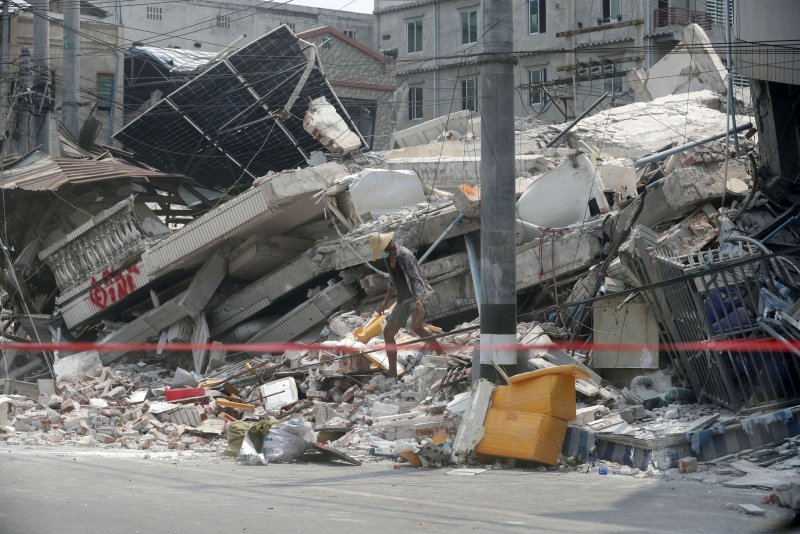A man clambers amid the ruins of a building in Mandalay, Myanmar, on Thursday. The country’s military government belatedly declared a cease-fire in its war with rebel groups five days after the country was devasted by a powerful quake that struck the central regions, close to Mandalay. Photo by Nyein Chan Naing/EPA-EFE
April 3 (UPI) — Myanmar’s ruling military junta declared a three-week-long unilateral cease-fire to aid the humanitarian and rebuilding effort five days after a devastating earthquake that killed at least 3,085 people and left the country’s second-largest city in ruins.
The government’s State Administration Council said in a statement Wednesday it would pause its military offensive against rebel groups through April 22.
“For paying sympathy to the victims of the earthquake across the country, for providing the effective rescue operation and rehabilitation,” state-run television reported.
The country’s military rulers extended the olive branch after international condemnation of its decision to continue airstrikes on rebel targets, including in Sagaing Province where the epicenter of Friday’s 7.7 magnitude quake was located, and calls by China for all sides to “prioritize earthquake relief efforts.”
The Chinese Foreign Ministry made the appeal Wednesday hours after Myanmar government forces opened fire on a convoy of Chinese Red Cross vehicles delivering disaster relief equipment and supplies in Shan State in the east of the country.
The ministry said none of the rescue personnel were hurt and their mission went ahead unhindered following the incident.
Ta’ang National Liberation Army rebels said junta troops opened fire with machine guns on the nine-vehicle convoy as it was en route to Mandalay on Tuesday — but the government said it was all a misunderstanding and insisted troops fired their weapons in the air and only after the convoy ignored orders to stop.
A government spokesman appeared to blame the Chinese Red Cross contingent for failing to inform the government of its movements, saying that international organizations must notify Naypyidaw of their presence.
The rebels who were providing security for the convoy insisted they had provided the military council with advance notice of the route being taken to Mandalay.
The country’s military leader Min Aung Hlaing was due to meet Thursday with regional leaders at a summit 800 miles away in Bangkok, Thailand, which is still recovering from the impact of the quake in the capital where at least 22 people were killed, 15 of them construction workers caught in the collapse of an unfinished skyscraper.
It was unclear if Min would be seeking assistance from his counterparts at the seven-nation summit amid United Nations reports that more than 1.7 million people in Mandalay were without power or running water.
Severe diarrhea and heat-related disease were on the rise amid humanitarian efforts that were being hampered by ongoing aftershocks and an acute shortage of resources, according to the United Nations.
Medecins Sans Frontieres told CNN that severe shortages of clean water were a particular problem, both in quantity and in quality, in earthquake-impacted areas but also country-wide.
“The lack of water is creating an issue in terms of immediate survival, but could also create an issue in terms epidemics in the future that we definitely want to avoid,” said MSF Field Coordinator Mikhael De Souza.
Secretary-General Spokesperson Stephane Dujarric said Wednesday that 45,000 people in and around Naypyitaw were receiving deliveries of drinking water after water-trucking operations began in the capital region, but that the assistance was only reaching a fraction of the more 300,000 who needed it.
The disaster struck when Myanmar is very poorly placed to cope, mired as it is in deep crisis due to an ongoing civil war ignited after the military overthrew the elected government, led by Aung San Suu Kyi‘s National League for Democracy, in a military coup in February 2021.
Four years of fighting has displaced huge numbers of people with the number in desperate need of humanitarian assistance standing at more than three million even before the earthquake, according to the U.N. Office for the Coordination of Humanitarian Affairs.
